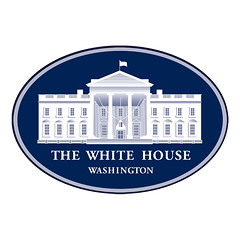| Executive Office of the President Seal (Photo credit: DonkeyHotey) |
Congress shall make no law respecting an establishment of religion, or prohibiting the free exercise thereof…” (from the First Amendment to The Constitution of the United States). The popularity of "separation of church and state" does not rule out different interpretations of what this part of the amendment intended, when written.
What's the problem? We know the framers of The U.S. Constitution fled powerful royal, political, and legal ties between governments or rulers (the State) and Religion. The new political landscape of the new republic must, the framers saw, maintain clear distance between the State and religion. One should not be allowed to co-opt the other. Any alliance or assimilation efforts would receive fast and furious push-back.
That's my take on it.
Voter instincts are on high alert now because it's a federal election year. We pay close attention to candidates' records and words. We want to know about candidates' vision of the country and government... and their words. How have they done in the past? What are specifics about how they intend to make things better nationally?
U.S. voters heat up at signs we might slide, as a nation, in the wrong direction on the constitutional "separation of church and state" guarantees. I know, I know..."separation of church and state" is not a constitutional phrase. I get it. But we use shorthand all the time to name complicated affirmations. "Church and state" is our way of speaking about specific guarantees of freedoms that are in the First Amendment of the Constitution.
Let's look at three seemingly small actions in February 2012 that deserve magnification:
- A presidential mandate co-opted religious institutions to ensure contraception access to employees or persons in care,
- A potential party nominee's beliefs about contraception clouded the mandate issue,
- The incumbent president quoted words of Jesus as authority for controversial tax policies.
First, an executive office mandate to co-opt religion deals with providing contraceptives, regardless of moral and religious beliefs. President Obama issued the mandate, ordering religious institutions' hospitals and outreach programs to provide contraception access regardless of their religious beliefs. If carried out, this would affect Catholic and Jewish institutions, and others. The government mandate on religious institutions could face high court review.
Second,a potential Republican nominee's beliefs about contraception raise concern about how he might view the religion and the state separation clause of The Constitution of the United States. He could have handled the matter successfully without seeming to "preach beliefs" to voters.
Instead, Senator Santorum talked as much about the religious basis for his beliefs about contraception during interviews about the contraception-provision mandate. He thereby opened a door for voters to question if he might push his views using personal religious beliefs as his authority, when much more would be required of any president.
So I can't figure why the senator chose to speak as much or more about the matter of contraception than the matter of a mandate coercing religious institutions to make them available. He lost a terrific chance to elaborate on religion-state issues of the contraception mandate to religious institutions; he could have done that with strong legal arguments and conviction.
Finally, early in February at the National Prayer Breakfast, President Obama said, paraphrasing Jesus' words*: "...'for unto whom much is given, much shall be required’" to give highest authority to his controversial plans for higher tax rates to "the wealthy" or "the rich" than to others.
But, the way the President used the scripture has interpretation and context problems: the biblical parable speaks of things given for a time (gospel of Luke 12: 40-48 has the details), while taxes deal with things earned, income worked for; Jesus' parable describes a relation between master and servant, the President's relation to citizens is public servant and the people, another big difference.
What is critically important about this is that Jesus was not even talking about taxes in Jesus' words the President quoted. Jesus was answering a question about the kingdom of heaven and the Lord’s return.
We're human and we interpret religion-state and state-religion issues in the "separation clauses" differently, and many people disagree about the meaning. This mighty document, The Constitution of the United States, ensures there shall not be any church-state union; that, however, does not prevent efforts to get around the guarantee.
The framers of The Constitution affirmed human freedoms as God-given and sacred. We know why they drew the line at coercion of religion on government or government on religion: they had lived under government-religion alliances, and they knew of other examples too; they knew that extreme tensions, pressures, and even bloody conflicts arise over alliances or assimilation of religion and government.
Think about it: as fought-for democratic rights, current elections fulfill a guardian-of-freedoms tradition. Whatever American's think or believe about “how to govern," most agree that we want to have a say, as free people, in the continuing security of the freedoms and rights secured for everyone by The Constitution. Of course we want to guard God-given freedoms! It may sound corny to some, but we do put freedom and country before political parties. We are a religious nation with a national inheritance as a free people apart from government.
Americans used to wake up and rise up when national and individual freedoms, including religious ones, were put at risk. We see some of that spirit returning in this new century. We sense a treasured duty toward elections, candidates, and speech, plus religious and other freedoms, and politics...they're all part of "American DNA."
______________________________________
*Source on context of Luke 12:48--For everyone to whom much is
given, from him much will be required; and to whom much has been committed, of
him they will ask the more--is in verses
40-48:
40Therefore you also be ready, for the Son of Man is coming at an hour you do not expect.”
41 Then Peter said to Him, “Lord, do You speak this parable only to us, or to all people?”
42 And the Lord said, “Who then is that faithful and wise steward, whom his master will make ruler over his household, to give them their portion of food in due season?
43 Blessed is that servant whom his master will find so doing when he comes.
44 Truly, I say to you that he will make him ruler over all that he has.
45 But if that servant says in his heart, ‘My master is delaying his coming,’ and begins to beat the male and female servants, and to eat and drink and be drunk,
46 the master of that servant will come on a day when he is not looking for him, and at an hour when he is not aware, and will cut him in two and appoint him his portion with the unbelievers.
47 And that servant who knew his master’s will, and did not prepare himself or do according to his will, shall be beaten with many stripes.
48 But
he who did not know, yet committed things deserving of stripes, shall
be beaten with few. For everyone to whom much is given, from him much
will be required; and to whom much has been committed, of him they will
ask the more.
Context Scriptures-Source: New King James Version of
the Bible published by Thomas Nelson; Biblegateway.com,
Words of Jesus in a parable, the kingdom of heaven and the return of the Lord
Copyright (c)2012 Opinari Writers












